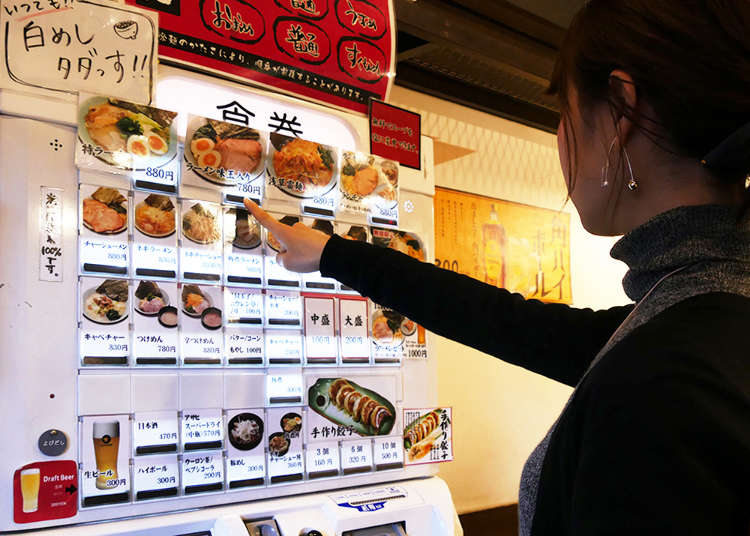
Eating ramen is an absolute must when coming to Japan! However, as you enter one of Tokyo’s many delicious ramen shops, you are very likely to find yourself standing in front of a vending machine – what? This “food ticket system” is a curious, convenient way to order your food, commonly found at ramen shops all throughout the country.
Japanese people are used to this easy, speedy way of ordering food, but first-timers tend to be confused, especially if everything is written in Japanese. Worry not, however, as these food ticket vending machines are easy to master, and we’ll show you how!
What are "Food Tickets"?
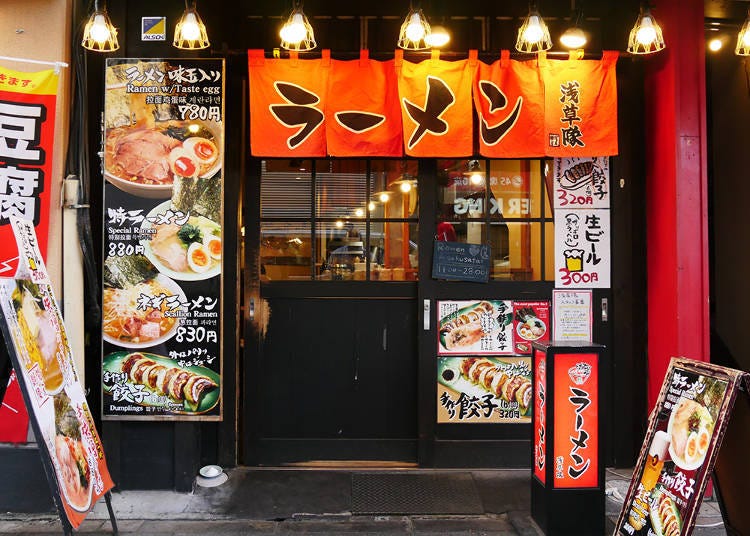
Japanese ramen restaurants can be divided into two groups: those with a full service system, and those with a food ticket system. The vending machines for the latter usually stand right next to the entrance or even outside, so you’ll immediately be able to tell how to order at the ramen place you’ve chosen.
If there is a menu or signboard outside, showing the ramen shop’s dishes, we recommend checking the dishes and deciding on what you want to eat before going in. Generally, there’s only one ticket machine available and if you take too long to make a choice, you suddenly might find a long queue behind you.
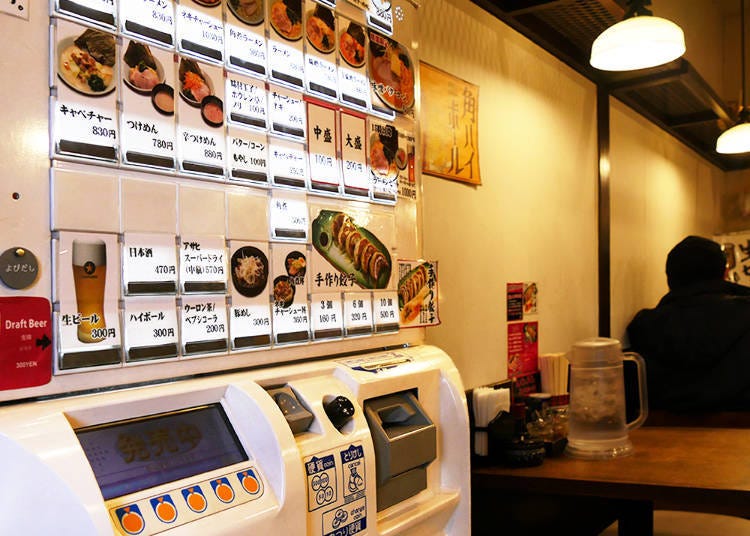
Ticket machines either have buttons to press or touch panels. Needless to say, the button type is the older version, with one button per dish. You’ll likely find them in old-fashioned restaurants that serve set meals or in privately-run ramen shops.
The more modern machines feature colorful touchscreens that offer their menu sometimes even in English and Chinese. In any case, the pictures of the food are large and vivid, so ordering isn’t hard at all, even if you don’t speak any Japanese. Large fast-food chains often have these kinds of machines installed.
How to order ramen in Japan: The 4 Steps to Get a Food Ticket!
The way of getting a food ticket and ordering differs slightly by restaurant, but there are four steps that all have in common. Let’s take a look!
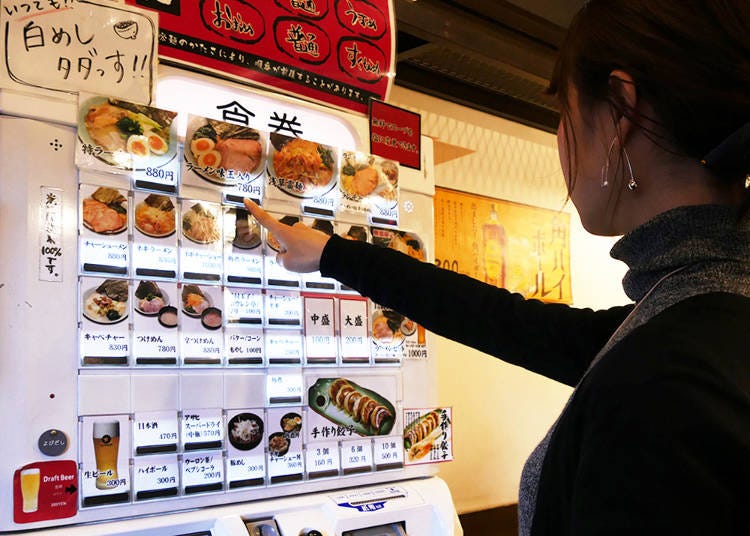
Step 1: Insert Money
Check the slots for coins and bills – though location of these can differ by machine, most will have an icon identifying where you insert money. Once you insert your money, the vending machine will recognize the amount and the dish buttons will light up or flash.
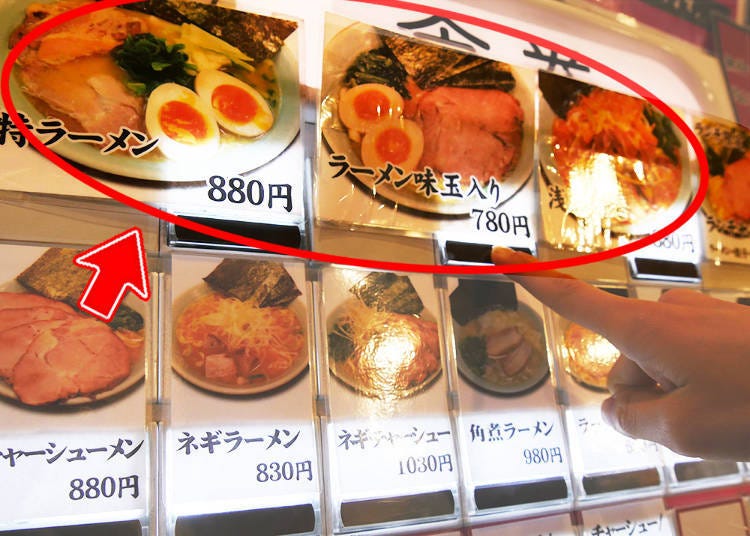
Step 2: Choose Your Dish!
Few ramen shops offer an English menu, so you will need to rely on images. Here is one important tip: if you can’t recognize what’s on the images or there are no images at all, choose one of the top left options of the ticket machine.
The reason for this is rather simple. A lot of shops make use of the habit of people to look at something in a Z-pattern – upper left to upper right, then lower left to lower right. Hence, they place their main menu options on the top left.
Another option is to ask the staff directly. Don’t be shy, even if you don’t speak Japanese! Here’s a sentence that’ll always net you a tasty dish:
“Osusume o oshiete kudasai (おすすめを教えてください)” - Which one would you recommend?
Ticket machines also offer a generous choice of toppings such as eggs and vegetables below the main menu. On top of that, side dishes can be ordered in the same manner, so why not enjoy some gyoza dumplings or a frosty glass of beer along with your food?
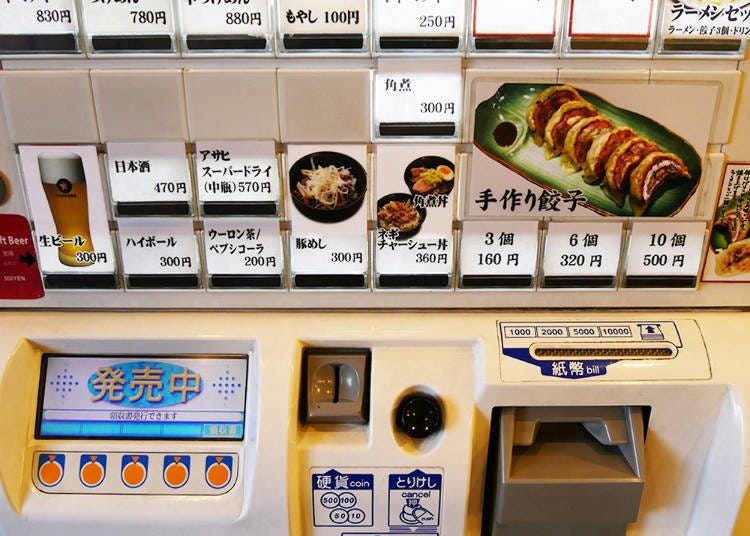
Step 3: Take Both Your Ticket and Change
After you’ve made your choice, the food ticket (or tickets) fall into a tray on the lower left. Take note that some vending machines will give you change along with it; at others you will have to push an extra button.
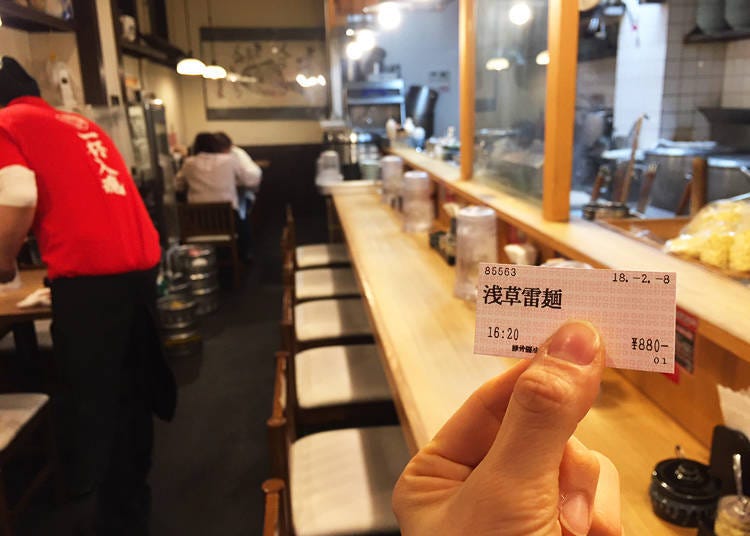
Step 4: Give Your Ticket to the Staff
After successfully retrieving a ticket turn towards the seating area and hand it over to the staff or chef of the restaurant. At certain shops, the staff will directly approach you right at the machine.
To earn an extra smile, do it like the Japanese gourmets and say this when you hand over your ticket:
“Onegai-shimasu (お願いします)” - Thank you for making our dish.
Then, the ticket may be ripped or cut, and you’ll get back one half. That slip receipt is supposed to be placed on your table - be sure that you don’t lose it before your order arrives!
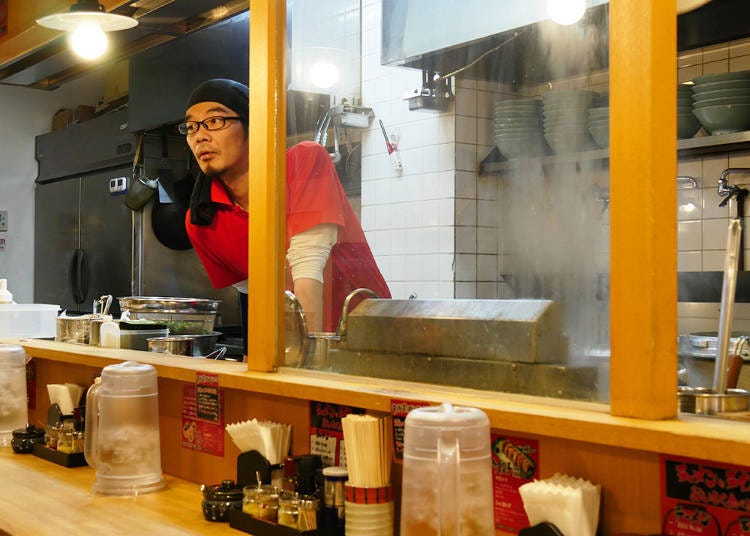
Sharing your preference: How to order your ramen?
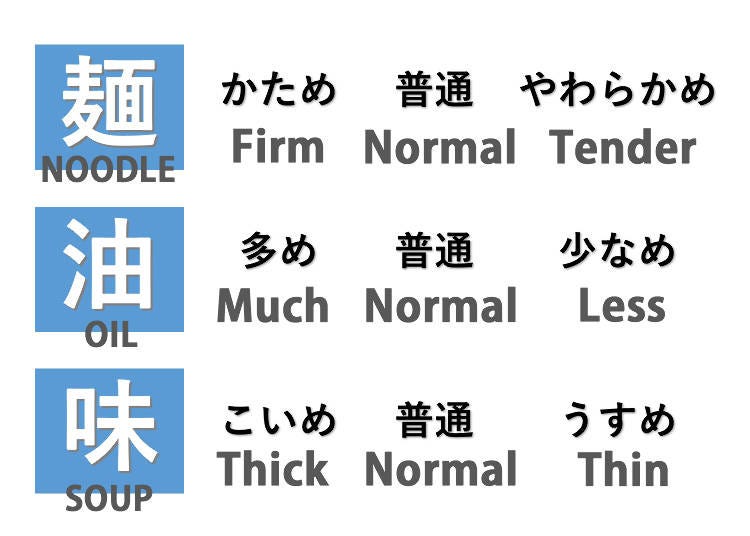
As ramen fans surely know, some shops offer certain choices to adapt the bowl to your personal preferences. You can choose the firmness (katasa) of the noodles from tender (yawarakame), regular (futsu), and firm (katame), as well as the thickness (kosa) of the soup to thin (usume), regular (futsu), or rich (koime). You’ll even be able to choose how oily your ramen bowl will be if you tell the staff to change the oiliness (abura) to little (sukuname), regular (futsu), or oily (ome). That may seem intimidating but properly customizing your bowl belongs to an authentic ramen experience, so go ahead and tell the staff your preference!
Even if you don’t have particular preferences, the shop will craft their bowl as they think is most delicious, so simply relying on the skillful ramen chefs is absolutely legit as well!
Here’s another bonus; a lot of ramen shops, such as the one we visited, service rice for free all day long! If you’re a big eater and your stomach has enough room try the delicious combination of white rice and ramen.
Wait for Your Freshly Made Bowl of Ramen
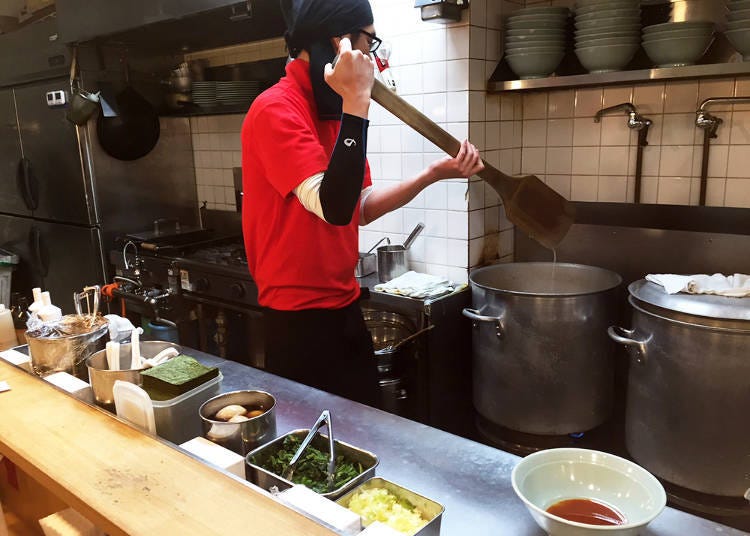
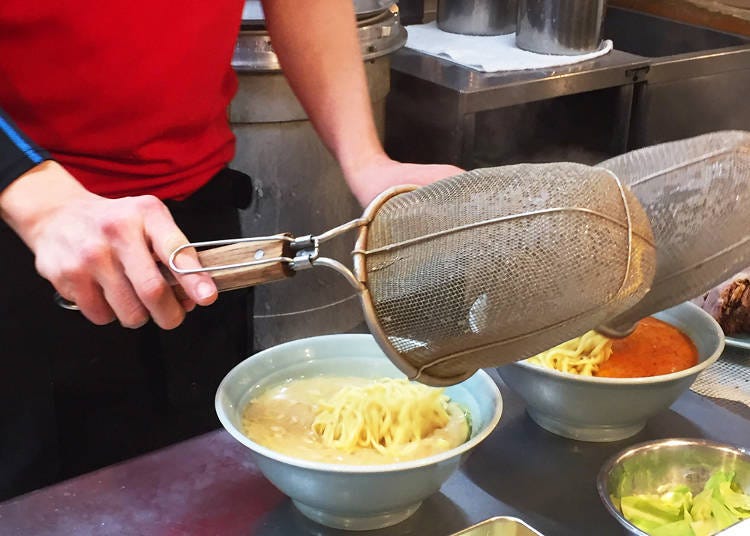
Once you’ve passed on your order, all you need to do is sit back and wait for your ramen to arrive. In many cases, you’ll even be able to watch the chef prepare it right in front of you if you sit at the counter!
Condiments, Spices, and Sauces – Free to Use!
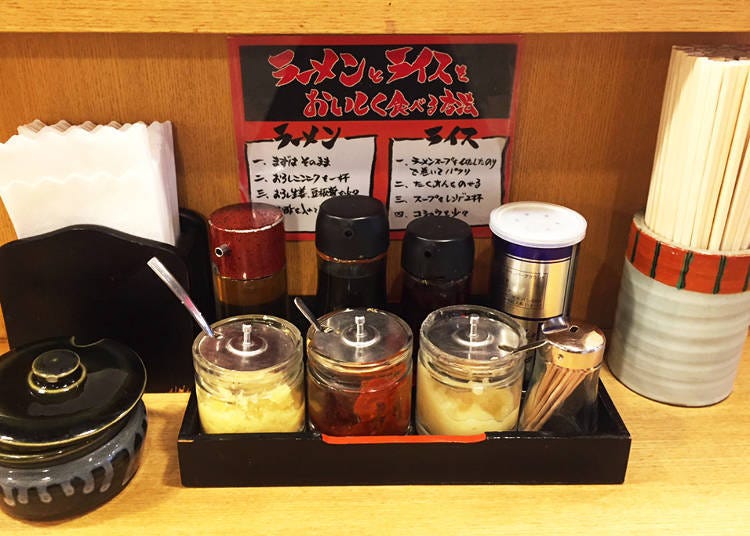
Ramen shops don’t just offer chopsticks and napkins right at the table but also a nice choice of condiments, spices, and sauces. Use as many of them as you want to further enhance the ramen to your liking! Just be careful to not put the little spoons in your soup.
Here are the Ramen Shop’s Most Popular Dishes
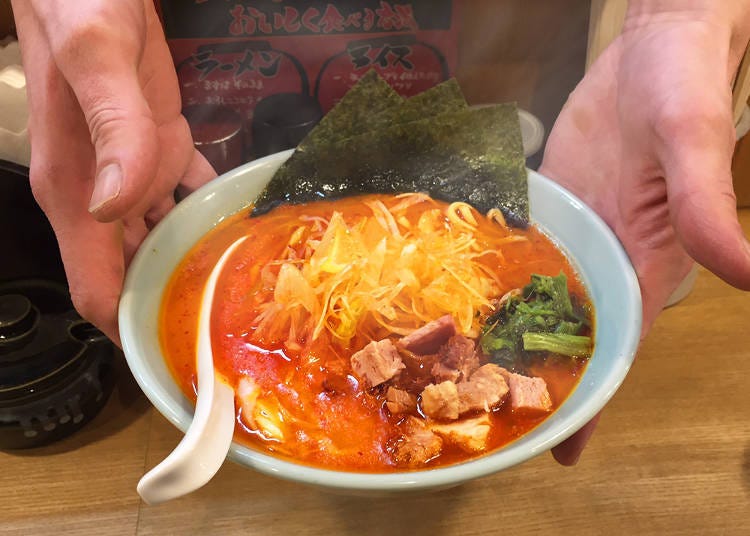
Let’s take a look at the two most popular ramen bowls of the shop that we visited. The first one boasts a red soup and is called “Asakusa Kaminari-men” (880 yen). It’s a rather spicy variety and especially guests from all around Asia seem to be in love with this bowl.
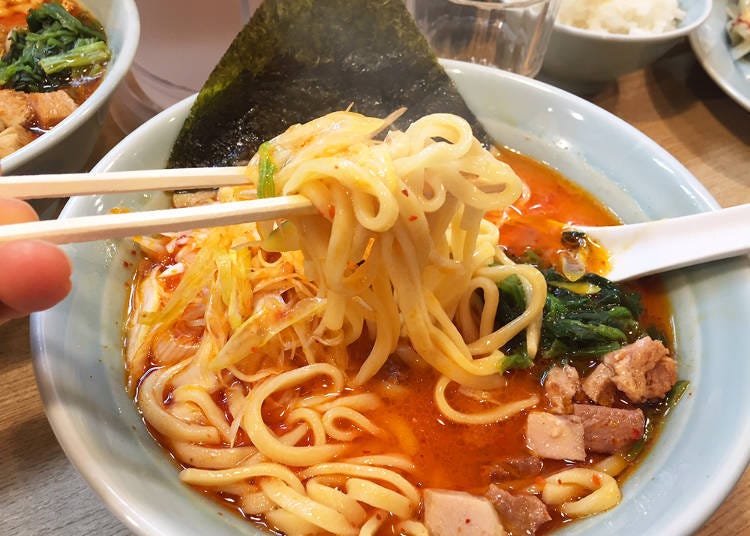
Diced, barbecued pork, finely chopped green onion, and spinach are the three main toppings for this savory ramen. The seasonings create a wonderfully spicy harmony that warms your mouth and stomach with every spoonful. The noodles are thick and firm to the bite and once you’ve eaten them all, we recommend adding free rice to the leftover soup for a one-of-a-kind ramen risotto! The white rice and the spicy soup are a superb match and you’ll be craving more in no time!
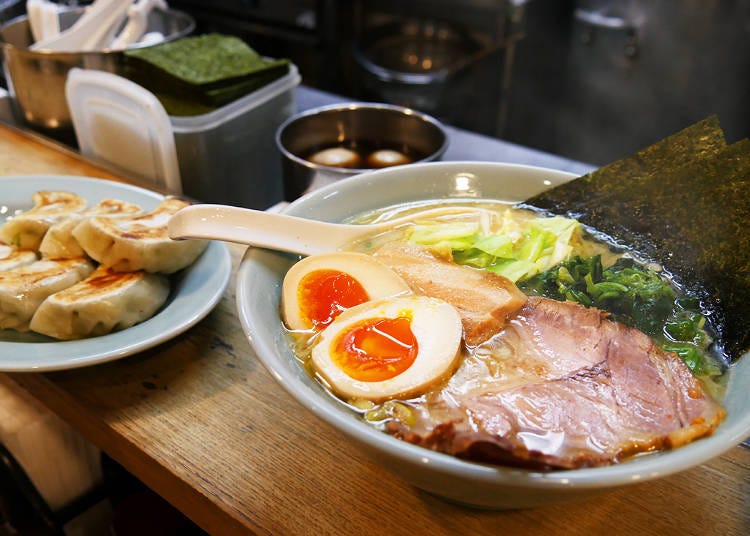
This picture shows the “Toku Ramen” (880 yen) with large slices of barbecued pork, as well as the homemade gyoza (6 dumplings for 320 yen). This mouthwatering bowl is soy source based with half-boiled egg, green onions, and spinach – it’s a more than generous serving! The gyoza are freshly made with every order, so we recommend eating them first while they’re still warm. If you’re still not quite satisfied after this, help yourself to a serving of free rice.
It takes about 10 minutes from the order to the finished bowl of ramen in front of you – the food ticket system is easy, convenient, and incredibly fast! As ramen goes digital, a lot of handy extra functions make their way into this system as well, and multilingual menus start to become more common. With the basic knowledge on how to order at a ramen shop, you can start your noodly adventures in Japan with confidence!
Asakusa-tai, Today’s Ramen Shop
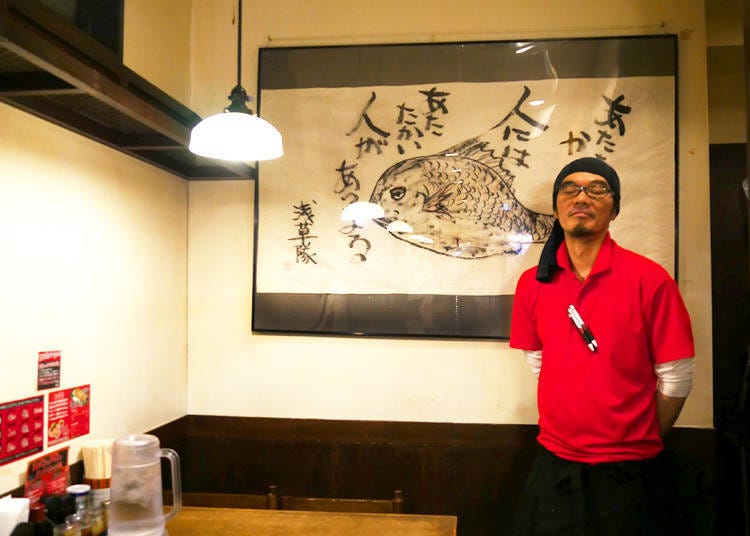
Asakusa-tai is just a one-minute walk away from Asakusa Station and right next to Baskin-Robbins.
Because of this convenient location, the charming ramen shop welcomes international tourists every day and on top of the English-speaking staff, its ticket machine features big, beautiful images. Don’t be afraid to ask about questions that you might have or personal preferences!
We are especially in love with Asakusa-tai’s sets. For lunch, look forward to ramen and gyoza for only 880 yen, while from 3:00 p.m., you can get your ramen order with a glass of cold beer for 1,000 yen. In a sightseeing-heavy area like Asakusa, such offers are somewhat hard to come by! Asakusa-tai is even a great place to go for a late night snack, as it’s open until 4:00 a.m.
- Area
- Category
*Prices and options mentioned are subject to change.
*Unless stated otherwise, all prices include tax.
Popular Tours & Activitiess
Recommended places for you
-

New in Ginza! Air BicCamera Ginza Opens with a Faster, More Convenient Shopping Experience
by: Guest Contributor
-

Jujutsu Kaisen Takes Over JR East With a Wrapped Shinkansen This Winter
by: Guest Contributor
-

Make Your Japan Trip Unforgettable! Explore "OSHI MAP" – Now Free and Unlimited
by: Guest Contributor
-

Only in Tokyo? A Legendary Manga Artist's New Masterpiece Is Hiding Underground
by: Guest Contributor
-

Japan’s Shinkansen Is About to Change Travel in an Unexpected Way
by: Guest Contributor
-

This Winter, Godzilla Takes Over Haneda Airport
by: Guest Contributor
Inspiration for Accommodations
-

Enjoy Mt. Fuji from the Comfort of Your Room! Recommended Ryokan with Mt. Fuji View
-

Stay Near the Cherry Blossoms! Hotels for Cherry Blossom Viewing in Tokyo
-

Family-Friendly Hotels with Free Shuttle to Disneyland: Convenient Access for a Magical Stay
-

Top Ranked Hakone Hotels with Mt. Fuji View: Enjoy Stunning Scenery from Your Private Space
-

Convenient Tokyo Hotels with Airport Shuttle: Ideal for Families and Heavy Luggage
-

Stunning Tokyo Tower View Hotels: Enjoy Spectacular Scenery from Your Private Space
-

Convenient Asakusa Hotels with Kitchens: Ideal for Extended Family Visits
-

Experience Luxury: Hakone's 10 Best Five-Star Accommodations
-

Enjoy Mt. Fuji Autumn Leaves! Top Hotels Near the Popular Autumn Leaves Corridor
-

Experience Hakone Fall Foliage from Your Room with Stunning Views
-
Ad

What to Eat on Your Japan Trip? Tonkatsu and Ramen Would Be Your Best Bet!
-

Slurp Up the Best Ramen in Tokyo: 12 Recommended Ramen Restaurants
-

JR Edition: Visit all of Tokyo in one Day with the Tokyo Metropolitan District Pass!
-

10 Important Japanese Phrases to Know Before You Enter a Japanese Convenience Store!
by: Teni Wada
-

Dream Ramen Alert! Tokyo's Top 3 Ramen Shops Near Ikebukuro Loved by Locals
-

Ramen Guru Eats 350 Bowls of Ramen a Year - Tells Us Where to Get the Best Ramen in Akihabara
- #best ramen tokyo
- #what to buy in ameyoko
- #what to bring to japan
- #new years in tokyo
- #best izakaya shinjuku
- #things to do tokyo
- #japanese nail trends
- #what to do in odaiba
- #onsen tattoo friendly tokyo
- #daiso
- #best sushi ginza
- #japanese convenience store snacks
- #best yakiniku shibuya
- #japanese fashion culture
- #best japanese soft drinks


















